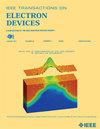具有 AlN 表面层的低开启电压和反向漏电流 β -Ga2O3 MIS 肖特基势垒二极管
IF 2.9
2区 工程技术
Q2 ENGINEERING, ELECTRICAL & ELECTRONIC
引用次数: 0
摘要
我们首次展示了具有低导通电压(${V}_{text {on}}$)和反向漏电流的垂直金属/AlN/ $\beta $ -Ga2O3 金属绝缘体-半导体(MIS)肖特基势垒二极管(SBD)。通过原子层沉积(ALD)技术实现的超薄氮化铝层,产生的氮化铝/ β - 镓氧化物 MIS SBD 显示出 0.1~\mu $ A/cm2 的超低漏电流,比传统的 β - 镓氧化物 SBD 小三个数量级。同时,AlN/ $\beta $ -Ga2O3 MIS SBD 的击穿电压从 208 V 显著提高到 890 V,同时保持了相对较低的 0.92 V 的 ${V}_\{text {on}}$和 11.8 m $\Omega \cdot $ cm2 的导通电阻(${R}_{\text {on}}$)。在 298 至 432 K 的温度范围内进行的 I-V 测量表明,如果插入 2 nm 的 AlN,热离子场发射(TFE)和阱辅助隧穿(TAT)是正向偏压下的主要电子传输机制,而当 AlN 厚度增加到 5 nm 时,TFE 成为主要机制。X 射线光电子能谱 (XPS) 表征揭示了 AlN/ $\beta $ -Ga2O3 异质结的 I 型排列,具有 1 eV 的大导带偏移($\Delta {E}_{C}$ ),在反向条件下可作为电子传输屏障,从而大大抑制漏电流。我们的研究首次表明,ALD 衍生的 AlN 薄膜在作为 $\beta $ -Ga2O3 SBD 的界面层方面具有巨大的潜力,而具有一流性能的 AlN/ $\beta $ -Ga2O3 SBD 为未来的电力电子技术开辟了更多的机会。本文章由计算机程序翻译,如有差异,请以英文原文为准。
Low Turn-On Voltage and Reverse Leakage Current β -Ga2O3 MIS Schottky Barrier Diodes With an AlN Interfacial Layer
We demonstrate for the first time a vertical metal/AlN/
$\beta $
-gallium oxide (
$\beta $
-Ga2O3) metal-insulator–semiconductor (MIS) Schottky barrier diode (SBD) with low turn-on voltage (
${V}_{\text {on}}$
) and reverse leakage current. By employing an ultrathin AlN layer enabled by atomic layer deposition (ALD), the resulting AlN/
$\beta $
-Ga2O3 MIS SBD exhibits a remarkably low leakage current of
$0.1~\mu $
A/cm2, which is three orders of magnitude smaller than that of the conventional
$\beta $
-Ga2O3 SBD. Meanwhile, the AlN/
$\beta $
-Ga2O3 MIS SBD shows a significantly improved breakdown voltage from 208 V up to 890 V, while maintaining a relatively low
${V}_{\text {on}}$
of 0.92 V and
on
-resistance (
${R}_{\text {on}}$
) of 11.8 m
$\Omega \cdot $
cm2, respectively. I–V measurements conducted across a range of temperatures from 298 to 432 K indicate that thermionic field emission (TFE) and trap-assisted tunneling (TAT) are the predominant electron transport mechanisms under forward bias if inserting 2 nm AlN, while TFE becomes dominant mechanism when the AlN thickness increases up to 5 nm. X-ray photoelectron spectroscopy (XPS) characterizations reveal the type I alignment for AlN/
$\beta $
-Ga2O3 heterojunction with a large conduction band offset (
$\Delta {E}_{C}$
) of 1 eV, which could function as an electron transport barrier under reverse conditions, thereby greatly suppressing the leakage current. Our study for the first time suggests a great potential for ALD-derived AlN films to be an interfacial layer in
$\beta $
-Ga2O3 SBDs and the AlN/
$\beta $
-Ga2O3 SBDs with state-of-art performances open up more opportunities in future power electronics.
求助全文
通过发布文献求助,成功后即可免费获取论文全文。
去求助
来源期刊

IEEE Transactions on Electron Devices
工程技术-工程:电子与电气
CiteScore
5.80
自引率
16.10%
发文量
937
审稿时长
3.8 months
期刊介绍:
IEEE Transactions on Electron Devices publishes original and significant contributions relating to the theory, modeling, design, performance and reliability of electron and ion integrated circuit devices and interconnects, involving insulators, metals, organic materials, micro-plasmas, semiconductors, quantum-effect structures, vacuum devices, and emerging materials with applications in bioelectronics, biomedical electronics, computation, communications, displays, microelectromechanics, imaging, micro-actuators, nanoelectronics, optoelectronics, photovoltaics, power ICs and micro-sensors. Tutorial and review papers on these subjects are also published and occasional special issues appear to present a collection of papers which treat particular areas in more depth and breadth.
 求助内容:
求助内容: 应助结果提醒方式:
应助结果提醒方式:


